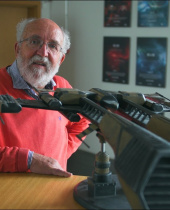From CCP Games:
CCP Games has added the ability for players of its massively multiplayer online game EVE Online to help search for distant planets outside of our solar system (AKA exoplanets) from within EVE’s virtual universe in the newest phase of its citizen science effort called Project Discovery. This unique scientific crowdsourcing effort is a collaboration between EVE Online developers, Massively Multiplayer Online Science (MMOS), Reykjavik University, and the University of Geneva and honorary professor Michel Mayor, who recently won the prestigious 2017 Wolf Prize for Physics. Together with Didier Queloz in 1995, Mayor discovered 51 Pegasi b – the first exoplanet orbiting a main sequence star.
EVE Online players of all skill levels and character ages can now interact with and analyse real-world astronomical data—long term measurements of luminosity of distant stars—from the CoRoT telescope, which was launched into outer space in late 2006 as part of its continued mission to discover extrasolar planets. Before being available in EVE Online, the CoRoT telescope data already lead to the discoveries of 37 exoplanets with transit photometry, the same method used to find exoplanets in the star system of Trappist-1.
While interacting with Project Discovery in EVE Online and contributing to consensus classification of the data that is then sent back to the MMOS Citizen Science Platform and the University of Geneva for verification, players can earn in-game rewards as well, such as PLEX, SKINs, and blueprints of prestigious CONCORD ships.
This data set is particularly suitable for citizen science efforts, as the collective power of many human brains provides a huge advantage in being able to detect strange light curves that computers can sometimes misunderstand. EVE Online players have a proven track record of providing communal accuracy by churning through over 20 million images in the successful first version of Project Discovery
that contributed human cell classifications to the Human Protein Atlas. Thanks to the work of EVE players, scientists managed to identify several examples of proteins as belonging to a new cellular structure called Rods & Rings.
Yves Flückiger, the Rector of the University of Geneva, lauds the effort. “The University of Geneva is proud to pioneer this new way to interact with so many people. The image of the ivory tower is long gone when hundreds of thousands are invited to participate to scientific discoveries.”
Professor Michel Mayor adds, “I discovered a new world 20 years ago with a telescope and another one this year when I learned about EVE Online and its players at EVE Fanfest.”
Professor Michel Mayor introduces you to this latest exciting chapter of Project Discovery, below.
The July release to EVE Online includes other changes of a more traditional EVE Online nature, including a complete rebalance of Tech 3 Cruisers, new models for the Rupture, Muninn and Broadsword, and more. Head to http://updates.eveonline.com and the patch notes for more information.
More about Project Discovery can be found on the Project Discovery website, in the dev blog detailing in-game rewards and how the system works, and in Michel Mayor’s EVE Fanfest 2017 presentation, which describes in more detail the science behind the search for exoplanets. More information about EVE Online is available at www.eveonline.com . The EVE Gameplay video, a recent trailer, and many more videos can be found on EVE’s YouTube channel.
This project has received funding from the European Union’s Horizon 2020 research and innovation program under grant agreement Nr 732703. Among 12 granted projects, the European Commission has given the maximum possible points to GAPARS, which is a key part of Project Discovery’s development.








